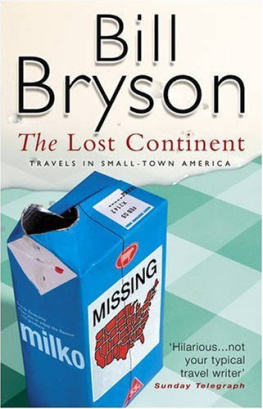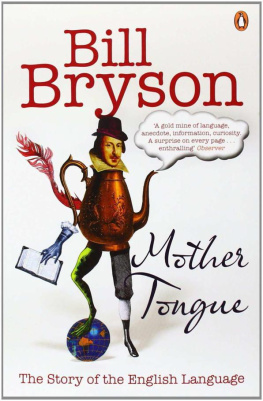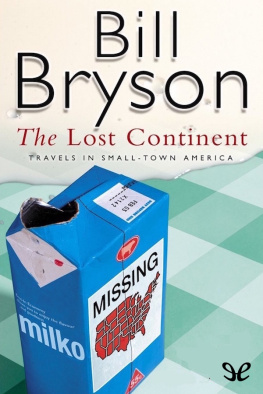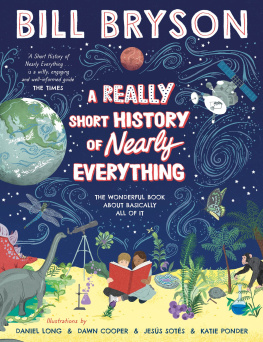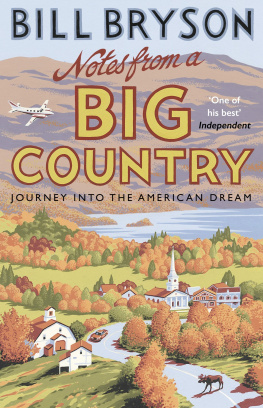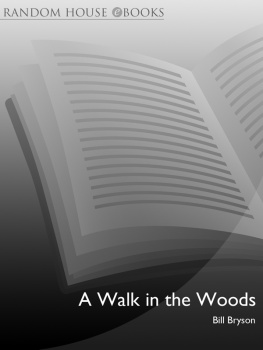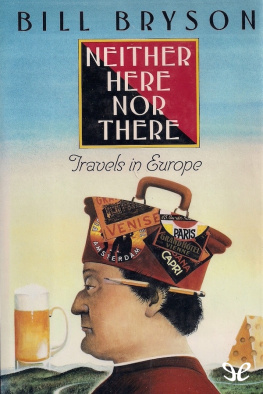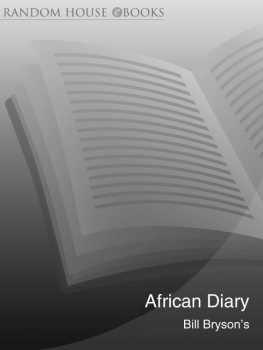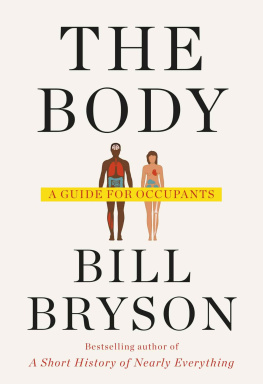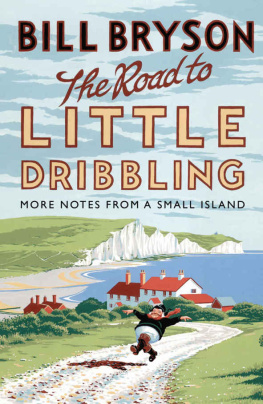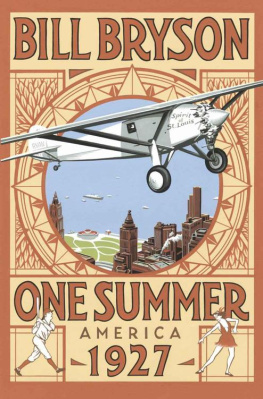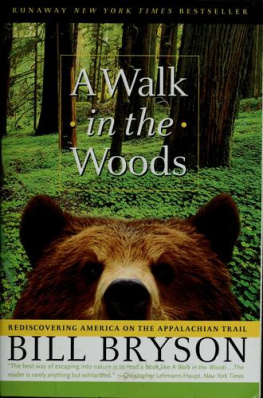Bill Bryson - Made in America
Here you can read online Bill Bryson - Made in America full text of the book (entire story) in english for free. Download pdf and epub, get meaning, cover and reviews about this ebook. year: 1998, publisher: Black Swan, genre: Detective and thriller. Description of the work, (preface) as well as reviews are available. Best literature library LitArk.com created for fans of good reading and offers a wide selection of genres:
Romance novel
Science fiction
Adventure
Detective
Science
History
Home and family
Prose
Art
Politics
Computer
Non-fiction
Religion
Business
Children
Humor
Choose a favorite category and find really read worthwhile books. Enjoy immersion in the world of imagination, feel the emotions of the characters or learn something new for yourself, make an fascinating discovery.

- Book:Made in America
- Author:
- Publisher:Black Swan
- Genre:
- Year:1998
- Rating:3 / 5
- Favourites:Add to favourites
- Your mark:
- 60
- 1
- 2
- 3
- 4
- 5
Made in America: summary, description and annotation
We offer to read an annotation, description, summary or preface (depends on what the author of the book "Made in America" wrote himself). If you haven't found the necessary information about the book — write in the comments, we will try to find it.
Made in America — read online for free the complete book (whole text) full work
Below is the text of the book, divided by pages. System saving the place of the last page read, allows you to conveniently read the book "Made in America" online for free, without having to search again every time where you left off. Put a bookmark, and you can go to the page where you finished reading at any time.
Font size:
Interval:
Bookmark:
THE LOST CONTINENT MOTHER TONGUE NEITHER HERE NOR THERE NOTES FROM A SMALL ISLAND A WALK IN THE WOODS NOTES FROM A BIG COUNTRY
MADE IN AMERICA
Bill Bryson
Illustrations by Bruce McCall
m
BLACK SWAN
MADE IN AMERICA A BLACK SWAN BOOK : 99805
Originally published in Great Britain by Martin Seeker 8c Warburg Ltd
PRINTING HISTORY Seeker 8c Warburg edition published 1994 Minerva edition published 1995 Black Swan edition published 1998
7 9 10 8
Copyright Bill Bryson 1994
Illustration; copyright by Btuce McCall
The right of Bill Bryson to be identified as the author of this work has been asserted in accordance with sections 77 and 78 of the Copyright, Designs and Patents Act 1988.
Condition of Sale This book is sold subject to the condition that it shall not, by way of trade or otherwise, be lent, re-sold, hired out or Otherwise circulated in any form of binding or cover other than that in which it is published and without a similar condition including this condition being imposed on the subsequent purchaser.
Black Swan Books are published by Transworld Publishers, 61-63 Uxbridge Road, London W5 5SA, a division of The Random House Group Ltd, in Australia by Random House Australia (Ptyj Ltd,
20 Alfred Street, Milsons Point, Sydney, NSW 2061, Australia, in New Zealand by Random House New Zealand Ltd,
18 Poland Road, Glen field, Auckland 10, New Zealand and in South Africa by Random House (Pty) Ltd, Endulini, 5a Jubilee Road, Parktown 2193, South Africa.
Reproduced, printed and bound in Great Britain by Clays Ltd, Sc Ives pic.
To David, Felicity , Catherine and Sam
Contents
Notes
433 453 6s
Select Bibliography Index
List of Illustrations
Founding Fathers Day, Plymouth Rock
Dame Railway and Her Choo-Choo Court, Cincinnati Ironmongery Fair, i8j2
Let us show you for just $i how to pack BIG ad ideas into smalt packages!!
Hoplocks amazing catch in the 1946 World Series
Wing dining, somewhere over France, 1929
New as nuclear fission and twice as powerful thats the new, newer, newest, all-new Bulgemobile!!
Acknowledgements
Among the many people to whom [ am indebted for assistance and encouragement during the preparation of this book, I would like especially to thank Maria Guarnaschelli, Geoff Mulligan, Max Eilenberg, Carol Heaton, Dan Franklin, Andrew Franklin, John Price, Erla Zwingle, Karen Voelkening, Oliver Salzmann, Hobie and Lois Morris, Heidi Du Belt, James Mansley, Samuel H. Beamesderfer, Bonita Lousie Billman, Dr John L. Sommer, Allan M. Siegal, Bruce Corson, and the staffs of the Drake University Library in Des Moines and the National Geographic Society Library in Washington. Above all, and as ever, my infinite, heartfelt thanks and admiration to my wife, Cynthia.
Introduction
In die 1940s, a British traveller to Anhoit, a small island fifty miles out in the Kattegat strait between Denmark and Sweden, noticed that the island children sang a piece of doggerel that was clearly nonsense to them. It went:
Jeck og Jill Vent op de hill Og Jell kom tombling after.
The ditty, it turned out, had been brought to the island by occupying British soldiers during the Napoleonic wars, and had been handed down from generation to generation of children for 130 years, even though die words meant nothing to them.
In London, this small discovery was received with interest by a couple named Peter and Iona Opie. The Opies had dedicated their lives to the scholarly pursuit of nursery rhymes. No one had put more effort into investigating the history and distribution of these durable but largely uncelebrated components of childhood life. Something that had long puzzled the Opies was the curious fate of a rhyme called Brow Bender*. Once as popular as Humpty Dumpty and Hickory Dickory Dock*, it was routinely included in children's nursery books up until the late eighteenth century, but then it quietly and mysteriously vanished. It had not been recorded in print anywhere since 1788. Then one night as the Opies nanny was tucking their children in to bed, they overheard her reciting a nursery rhyme to them. It was, as you will have guessed, Brow Bender*, exactly as set down in die 1788 version and with five lines never before recorded.
wii
Is
Now what, you may reasonably ask, docs any of this have to do with a book on the history and development of the English language in America? I bring it up for two reasons. First, to make the point that it is often the little, unnoticed things that are most revealing about the history and nature of language. Nursery rhymes, for example, are fastidiously resistant to change. Even when they make no sense, as in the case of Jack and Jill with children on an isolated Danish isle, they are generally passed from generation to generation with solemn precision, like a treasured incantation. Because of this, they are often among the longest-surviving features of any language. Eenie, meenie, minie, mo is based on a counting system that predates the Roman occupation of Britain, and that may even be pre-Celtic. If so, it is one of our few surviving links with the very distant past. It not only gives us a fragmentary image of how children were being amused at the time that Stonehenge was built, but tells us something about how their elders counted and thought and ordered their speech. Little things, in short, are worth looking at.
The second point is that songs, words, phrases, ditties any feature of language at all can survive for long periods without anyone particularly noticing, as the Opies discovered with Brow Bender. That a word or phrase hasnt been recorded tells us only that it hasnt been recorded, not that it hasnt existed. The inhabitants of England in the age of Chaucer commonly used an expression, to be in bide and hair, meaning to be lost or beyond discovery. But then it disappears from the written record for four hundred years before resurfacing, suddenly and unexpectedly, in America in 1857 as neither bide nor hair. It is dearly unlikely that the phrase went into a linguistic coma for four centuries. So who was quietly preserving it for four hundred years, and why did it so abruptly return to prominence in the sixth decade of the nineteenth century in a country two thousand miles away?
Why, come to that, did the Americans save such good old English words as skedaddle and chitterlings and chore> but not fortnight or heath ? Why did they keep the irregular British pronunciations in words like colonel and hearth , but go our own way with lieutenant and schedule and clerk} Why in short is American English die way it is?
This is, it seems to me, a profoundly worthwhile and fascinating question, and yet until relatively recent times it is one that hardly anyone thought to ask. Until well into this century serious studies of American speech were left almost entirely to amateurs - people like the heroic Richard Harwood Thornton, an English-born lawyer who devoted years of his spare time to poring through books, journals and manuscripts from the earliest colonial period in search of die first appearances of hundreds of American terms. In 1911 he produced the two-volume American Glossary. It was a work of invaluable scholarship, yet he could not find a single American publisher prepared to take it on. Eventually, to the shame of American scholarship, it was published in London.
Not until the 1910s and 30s, with the successive publications of H. L. Menckens incomparable The American Language , George Philip Krapps The English Language in America, and Sir William Craigie and James R. Hulberts Dictionary of American English on Historical Principles , did America at last get books that seriously addressed die question of its language. But by then the inspiration behind many hundreds of American expressions had pasUd into the realms of the unknowable, so that now no one can say why Americans paint the town red, talk turkey , take a powder or hit practice flies with a fungo bat.
Next pageFont size:
Interval:
Bookmark:
Similar books «Made in America»
Look at similar books to Made in America. We have selected literature similar in name and meaning in the hope of providing readers with more options to find new, interesting, not yet read works.
Discussion, reviews of the book Made in America and just readers' own opinions. Leave your comments, write what you think about the work, its meaning or the main characters. Specify what exactly you liked and what you didn't like, and why you think so.

